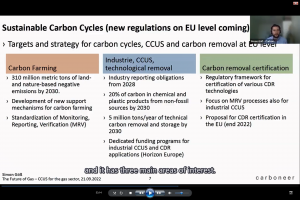CHINA: Carbon Neutral by 2060
the business opportunities for EU energy solutions providers

Session Two: CCUS for the Gas Sector (Downloads: Summary, Presentations)
- Simon Göß – Independent expert, CARBONEER
- Benoit de Guillebon, Project Lead PYCASSO
- Kevin Tu, China Expert, AGORA ENERGIEWENDE
- Lauri Myllyvirta, Lead Analyst, CENTRE for RESEARCH on ENERGY & CLEAN AIR
- François Issard – International Energy Consultant and China Expert – MODERATOR
Video of Session 2
(English subtitled)
(English subtitled)
Discussion highlights
Carbon capture, utilisation and storage (CCUS) has a huge potential for carbon footprint control and removal, especially in hard to abate sectors, such as steel, chemicals, fertiliser and manufacturing. Individual CCUS facilities capture CO2 1-2 Mt/yr. If scaled up, capacities of CO2 5-10 Mt/yr could be reached.
In the last 20 years, CCUS technology has been developed mainly in the form of demonstration projects; it is a proven technology, but widespread application is yet to come.
As CCS and CCUS projects take time to implement, it is important that incentive schemes are politically stable and credible in terms of long-term price development.
It is a question of economics: There are many options to incentivise CCUS, such as financial support, CO2 pricing and regulation. Carbon markets already give price signals to industry, i.e., CO2 prices of around €80/tonne in the European Emissions Trading System (ETS). In China, the carbon price is not yet high enough to justify the cost efficiency of the CCUS value chain.
